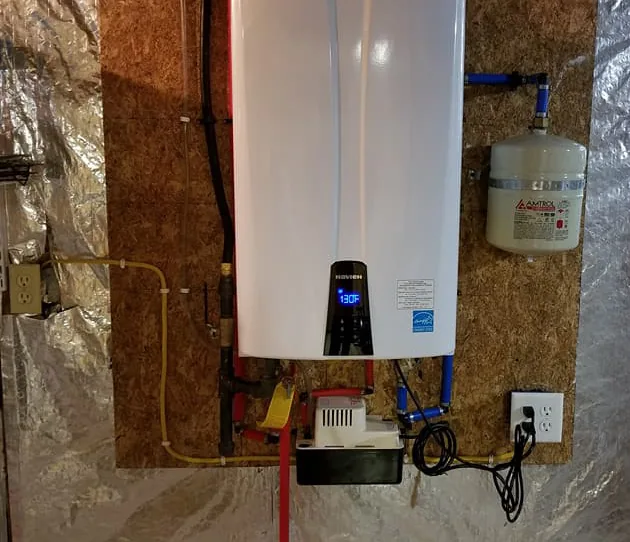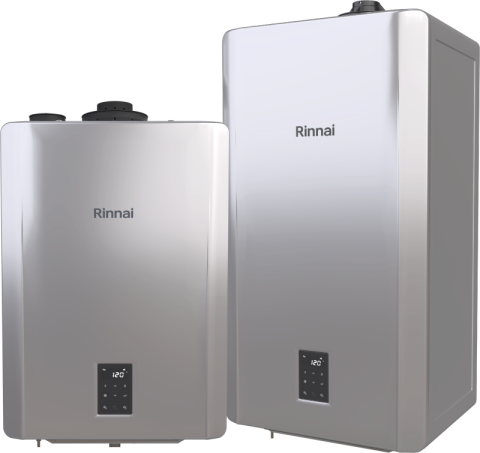Why On-Demand Water Heaters Deliver Unmatched Benefits
Why On-Demand Water Heaters Deliver Unmatched Benefits
Blog Article
In this article in the next paragraphs you can get a bunch of professional facts involving Pros and Cons of Tankless Water Heater.

In a world where comfort and efficiency preponderate, it's no surprise that home owners are constantly in search of smarter methods to manage their home's energy consumption and convenience. One development that has actually gradually acquired popularity is the tankless water heater. Yet what exactly makes these systems stand out from the standard tank-based versions the majority of us matured with? Let's dive in and explore the benefits of tankless hot water heater, helping you determine if it's time to make the switch in your home.
Intro
Picture this: you enter the shower after a lengthy day, anticipating a relaxing waterfall of hot water, only to be welcomed by icy beads since the last individual used it all up. Sound acquainted? Standard hot water heater save a set amount of warm water, implying you go to the grace of that storage tank's supply. Tankless systems, on the other hand, warmth water as needed. No more running out mid-shower, no more wrestling with routines just to ensure warm water is offered.
Understanding Tankless Hot Water Heater
What Are Tankless Water Heaters?
Tankless hot water heater, in some cases called on-demand or immediate hot water heater, supply warm water only as it's required. Instead of keeping gallons of pre-heated water, these systems kick right into activity the minute you switch on the faucet. Water goes through a heat exchanger, warming up in real-time, suggesting you obtain a nonstop flow of warm water without the demand for a huge storage tank sitting idly by.
Just how Do They Vary from Typical Equipments?
Standard heating units hold a reservoir of warm water, making use of energy to keep that container at a regular temperature level. Tankless systems eliminate the standing supply, cutting down on thrown away energy and the large impact of a big cylinder. Basically, you're updating from a "accumulation" attitude to a "made-to-order" technique.
Usual Types of Tankless Systems
Tankless water heaters normally can be found in 2 ranges: gas and electric. Gas versions have a tendency to provide greater flow rates, perfect for larger homes, while electrical versions typically offer smaller sized homes and are generally much easier to mount. In addition, some systems are made for point-of-use (offering one component) while others can take care of the whole home's warm water requirements.
Trick Benefits of Tankless Hot Water Heater
1. Countless Warm Water Supply
Ever before needed to schedule showers so everyone obtains their fair share of hot water? With tankless, that ends up being a thing of the past. As long as the heating system's flow capacity isn't exceeded, you can take back-to-back showers without becoming a popsicle.
2. Energy Performance and Price Cost Savings
No more heating up a giant storage tank's worth of water and keeping it warm all the time. Tankless heating systems decrease standby power losses, which can lower energy bills. While the preliminary cost may be greater, the long-lasting financial savings often validate the financial investment.
3. Space-Saving Layout
If your home is short on storage, getting rid of the large tank liberates beneficial room. Tankless units are compact and can commonly be installed on wall surfaces, stashed in edges, or set up in limited utility wardrobes without hogging the entire room.
4. Longer Life-span
A well-maintained tankless water heater can outlive its tank-based cousin. Conventional tanks may last 10-15 years, while tankless versions can keep chugging along for twenty years or even more, making them a strong investment in time.
5. Improved Water Top Quality
Saving water in a storage tank can occasionally lead to debris build-up or a slightly "off" taste. With tankless systems, fresh water is heated up instantly, minimizing the possibilities of debris accumulation and potentially supplying cleaner-tasting water.
Considerations Prior To Changing
Though the benefits are compelling, it's wise to take into consideration a couple of variables prior to completely committing.
First Financial Investment Expenses
Tankless heaters usually come with a greater in advance price tag. In between the unit itself and possible setup alterations, the first expense might give you sticker label shock. However bear in mind to view it as a long-term financial investment.
Setup Needs
Depending upon your home's facilities, you may need extra electrical capacity or gas line upgrades. Guarantee you understand the installment requirements and seek advice from a professional to avoid shocks.
Reviewing Your Home's Water Use Patterns
If your home simultaneously uses several fixtures with high hot water demand, ensure the unit's flow price fulfills your demands. Recognizing your use patterns assists you pick the ideal size and type of tankless heating system.
Upkeep and Care Tips
Tankless systems are relatively low maintenance, yet they aren't set-it-and-forget-it appliances.
Normal Cleansing and Descaling
Difficult water minerals can build up in the warm exchanger, impacting performance. Normal descaling (usually suggested every year) keeps the unit performing at peak performance.
Yearly Specialist Assessments
A yearly checkup from a professional makes sure minor issues are captured early. They'll assess the system's efficiency, look for leakages, and aid maintain optimal effectiveness.
Ensuring Proper Air Flow
For gas models, proper ventilation is important to securely eliminate exhaust gases. Make sure venting systems are clean and properly set up to prevent any potential safety threats.
Contrasting Different Brands and Versions
Not all tankless hot water heater are developed equivalent.
Investigating Dependable Manufacturers
Look for respectable brands with a history of producing top quality devices. A trusted maker commonly provides far better client assistance and longer guarantees.
Reviewing Evaluations and Individual Responses
User testimonials and feedback from next-door neighbors or pals that have gone tankless can provide useful understandings. In some cases, real-life experiences can be extra telling than marketing pamphlets.
Setup: Do It Yourself or Expert?
While some homeowners enjoy dealing with projects themselves, tankless setup may not be the very best time to burst out the tool kit.
Benefits and drawbacks of Do It Yourself Setup
A DIY mount can conserve cash, but it includes threats. Wrong installment can bring about inefficiency or safety problems. If you come in handy and have experience, it could be feasible-- however proceed with care.
When to Call a Professional Plumbing Technician
For a lot of, calling a pro makes certain every little thing's done properly. An expert plumber understands neighborhood codes, sizing needs, and venting parameters, minimizing the risk of incidents.
Optimizing Efficiency
You've bought a tankless unit-- now maximize its efficiency.
Ideal Temperature Level Setups
Many people set their devices between 120-140 F. Changing the temperature can boost convenience and savings. Experiment to find a wonderful spot that does not lose energy.
Coupling With Low-Flow Fixtures
Want to extend your unit's abilities? Consider setting up low-flow showerheads and taps. They minimize water usage, enabling your tankless system to supply a steady stream of hot water without stressing.
Ecological Impact
Tankless hot water heater line up with greener living objectives.
Lowered Carbon Impact
By using much less energy and only home heating water as needed, tankless systems can decrease your home's carbon impact, minimizing your environmental impact.
Preserving Natural Resources
Less energy usage and much less lost warm water equate into less natural deposits being used, an ecological win-win.
That Benefits Most from Tankless Heating units?
The appeal of tankless heating systems is that they can suit a range of houses.
Large Families vs. Solitary Occupants
Big family members might like the endless warm water supply, while solitary owners appreciate the power financial savings from not warming a whole tank for simply someone's morning shower.
House Owners with Minimal Space
If your home is short on square video, shedding the large storage tank frees up space for various other fundamentals-- or maybe simply extra breathing space.
Eco-Conscious Customers
Going tankless aligns with eco-friendly worths, ensuring you're not losing energy or sources.
Future Trends in Tankless Hot Water Heater
The world of home devices is ever-evolving, and tankless water heaters are no exception.
Smart Home Integration
Think of changing your water heater's temperature level using an application or obtaining maintenance signals on your phone. As wise home tech advancements, we'll see more connectivity and comfort.
Innovations in Technology
R&D is regularly enhancing warmth exchangers, making devices more effective and long lasting. Future designs might be even quieter, a lot more small, and better matched for differing environments.
Conclusion
Selecting a tankless water heater is more than just updating your home's warm water system; it's purchasing long-lasting comfort, power performance, and a greener way of life. By considering your household's water use, being mindful of installment demands, and committing to routine upkeep, you can take pleasure in a steady stream of hot water without the luggage of a large storage tank. As technology develops, you can look forward to also smarter, a lot more reliable tankless options that not just make your life simpler however additionally profit the world.
Pros and Cons of Tankless Water Heaters
Tankless Water Heater Pros
Saves Energy: Simply put, you re spending less energy to create hot water, so your total carbon footprint goes down, not to mention your bills. Lasts Longer Than Storage Tanks: Storage tank units need to be replaced every 15 years or so. But tankless units? They can last for 30 years before they give out on you. Constant Hot Water: Need to take a shower and don t want the water running cold? Awesome it won t. The water will stay hot the entire time because it creates hot water on demand. Saves You Money: Less water usage equals less money. Beyond that, you re not paying to keep water hot 24/7. Those savings add up quickly. Better for the Environment: Less water waste is better for everyone. It saves you money, but it s also environmentally conscious at the same time. Tankless Water Heater Cons
It Can Take a Minute: Depending on your specific unit and its placement, it can take anywhere from 10 seconds to 2 minutes to fully heat up. Because there s no storage tank, it heats water as you need it. Upfront Purchase Price: While we talked about their longevity, there s sticker shock when you look at brand-new tankless units to install. It pays for itself, but it s still a big chunk of change at first. Has its Limits: If you run multiple appliances at once, such as the dishwasher, washing machine, and maybe you take a shower at the same time, there might not be enough hot water. https://www.airsouthnow.com/blog/water-heater-service/pros-and-cons-of-tankless-water-heaters/

Do you like more info about ? Make a short review down the page. We would be delighted to know your insights about this blog entry. In hopes that you come back again later on. Make sure you take a moment to promote this post if you appreciated it. We treasure your readership.
Go Company Report this page